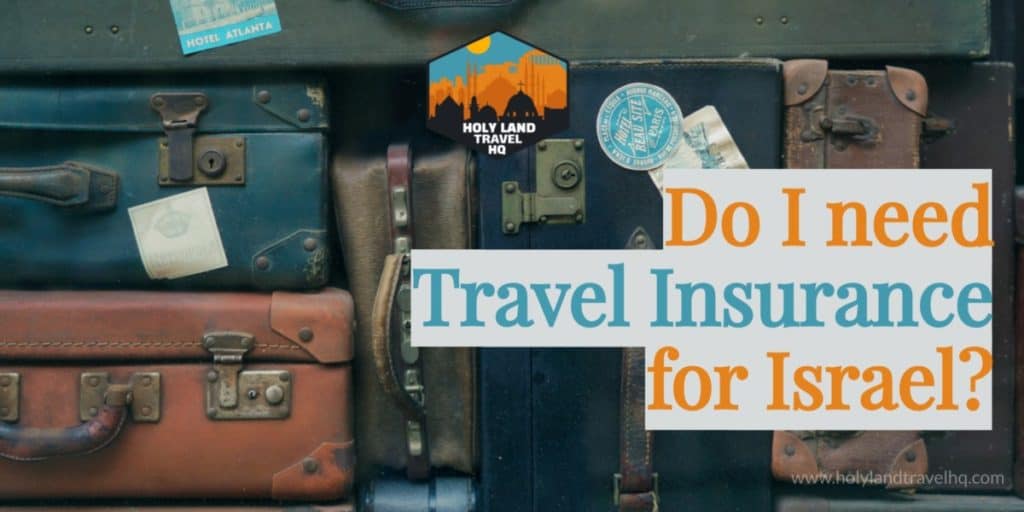
Traveling is fun, but things can change fast. Luggage can get lost. Flights can get canceled. You can get injured or fall sick from a virus. Odds are, your Holy Land tour will go off without a hitch, though.
So, do you need travel insurance for Israel? It’s not required; however, I strongly recommend that you do. If you have health concerns, or you feel uncomfortable not having a safety net, you’ll want to have it.
As an American citizen, no government will require you to have insurance. However, your tour leader may require you to get it.
Why should I consider getting travel insurance for Israel?
There are many reasons why travel insurance is a good idea. The first is that travel insurance often covers more than just medical costs. Here is a list of items travel insurance can cover.
- You get injured or need to see a doctor.
- You have dental issues and need to see a dentist.
- You are older and have health concerns.
- You go to the emergency room.
- You have a trip delay or canceled flight and need a room for the night.
- Your bags get delayed, and you need an extra outfit.
- Your bags get lost, and you need to replace everything.
- Repatriation of remains in the case of death.
- Life insurance in the case of death.
- There is a natural disaster or political evacuation.
- The zombie apocalypse happens, and you need to get back to your underground bunker ASAP.
There are a plethora of insurance companies out there. Plans can vary based on your specific needs. In some instances, your current medical insurance plan may have overseas travel options or upgrades, which you should consider.
Be Responsible. Don’t be Frustrated.
One of the big reasons why I like having travel insurance is I don’t know what to expect. On my first tour with the Navy, I broke my hand while out at sea. When we pulled into Australia, I had to go to the hospital for surgery. Because I was with the US Government, they took care of everything. But if I wasn’t with the Navy, I would have been left to deal with it on my own. The bureaucracy was frustrating and process cumbersome.
The kicker with many of the travel insurance companies is they will have a liaison familiar with the country. So, if you do get travel insurance, make sure the company has a good customer service reputation. And has in-country contacts.
Another good reason to get coverage is if your group leader wants everyone to get it. Or maybe he or she has set up a group plan you can buy in to.
Lastly, getting insurance is a good way to respect your group. If something happens, it will give them the peace of mind that you are going to be taken care of. And it will give you peace of mind that their trip isn’t ruined because of you.
What should I get covered?
Talk to your medical insurance provider to see what foreign travel options they have. If they have options available, you may only need a separate supplemental insurance plan to cover non-medical issues.
If your medical insurance company has nothing or coverage that is not to your liking, then a comprehensive plan is the way to go.
The non-medical coverage options you want are: lost bags, delays, cancelations, emergency evacuations, life insurance, and repatriation of remains.
Many companies will ask you what countries you will visit. Don’t worry about your layovers, but if you plan to visit a layover country, your trip is a multi-country trip. Some coverage is worldwide, and you don’t need to worry about a multi-country trip. Other coverage can be specific to one country, and you may need to set up individual plans for each.
There will often be levels of coverage, as well. A few items might get added, so the coverage amounts will be more. Instead of $25,000 medical coverage on the basic plan, the platinum plan might cover $100,000.
How much does travel insurance cost?
The cost of traveler’s insurance varies. It can range anywhere from $36 to more than $500. The factors that contribute to this are:
- Age
- State of residency
- Destination
- Length of travel
- Pre-existing conditions
- Group vs. individual plans
- The cost of your trip
- Whether you are buying comprehensive or supplemental insurance
- Whether you are buying the basic level or top level of coverage
Many well-known American insurance companies back travel insurance companies. AIG and Nationwide are two that I know of.
What are the best travel insurance companies?
Below are some companies that I researched and felt were good enough to discuss.
For a general insurance search, check out insuremytrip.com (direct link) to get quotes from multiple companies.
For the estimates I provide below, I requested quotes from the companies using a fictional couple. The couple is from California and both are 55 years old. They are both healthy and have no pre-existing conditions. The total cost of the trip for them is $9,000. Or $4,500 each. That is $3,000 for the tour and $1,500 for airfare each. We’ll name them Joe and Lisa.
World Nomads
World Nomads (worldnomads.com) (direct link) has probably the best comprehensive coverage for a reasonable cost. They cover a wide range of travel problems including:
- Medical repatriation
- Terrorism
- Travel accidents
- Lost baggage
- Schengen insurance
- Trip cancellation
- Travel Health
- Death overseas
- Stolen credit cards
- Natural disasters
- Stolen passports
- Delayed baggage
- Emergency overseas medical
- Overseas dental
- Assault
World Nomads does not cover pre-existing conditions. The look back period is 90 days.
For Joe and Lisa, World Nomad is offering the Standard Plan for $151.73 total. And the Explorer Plan is $256.60 total. The cost covers both of them.
Travelex Insurance Services
Travelex (travelexinsurance.com) (direct link) offers two levels of comprehensive coverage and a separate flight insurance plan. Costs can range in the several hundreds of dollars. Pre-existing conditions are accepted. The look back period is 60 days. You must purchase the plan in advance of your departure. 15 days for the Basic Plan and 20 days for the Select plan.
For Joe and Lisa, Travelex is offering a basic plan at $334 total. And a Select plan at $464 total. The difference between the two is the amount of coverage provided. There are also a few extra available options, such as adventure sports accidents.
Allianz Travel
Allianz (allianztravelinsurance.com) (direct link) has three levels of single trip comprehensive coverage and four levels of multi-trip coverage. They also have a stand-alone rental car coverage plan and trip cancellation plan. Flight cancellations and delays are included in their other plans as well. Pre-existing condition options are available. The look back period is 120 days.
For Joe and Lisa, Allianz is offering a Basic Plan for $400 each. A Prime Plan for $504 each. And a Premier Plan for $608 each. This is an expensive service no doubt. However, once you review the plans you’ll notice the higher level of coverage.
Safety Wing
Safety Wing (safetywing.com) (direct link) is one of the two flat-rate companies on this list. Costs range from $37 to $128 and are broken down by age groups. Pre-existing conditions are not covered. The look back period is 2 years.
For Joe and Lisa, Safety Wing is offering a flat rate of $94.08 each per 28 days. As with Allianz, but in reverse; if we look at the coverages we’ll see a lower amount. So it depends on how much you want to get covered.
Tokio Marine HCC
Tokio Marine (hccmis.com) (direct link) provides single traveler, group travel and student travel plans. It is the only company on this list which breaks their plans down into categories. It offers plans for Groups, students, business people, missionaries, and adventurers. Tokio Marine does not cover pre-existing conditions. The look back period is 2 years.
For Joe and Lisa, Tokio Marine is offering an International Plan at $101 total. And an International Premium Plan at $158.20 total. Tokio Marine is the company that backs Safety Wing, so it makes sense that it offers somewhat similar rates. Make sure to read the Description of Coverage found on their website before you buy.
iNext backed by Nationwide.
iNext (inext.com) (direct link) is backed by Nationwide Insurance. They offer both a comprehensive option and a supplemental option. The Comprehensive Basic plan starts at $295, with the Comprehensive Ultimate Plan starting at $375.
There are three flat-rate Supplemental Plans ranging from $34.50 to $82. These plans are designed to supplement the insurance you already have. The comprehensive plans offer a wider scope of coverage.
Group plans and pre-existing condition upgrades are available. The look back period is 60 days.
The iNext website does not give quotes for their comprehensive plans. Potential customers must enter in purchase details before a full price is revealed. So I did not get a quote for Joe and Lisa from iNext.
More Research
In my research I also came across a really good article on travel insurance by a couple who discusses financial issues. Their site, clubthrifty.com (direct link), had some of the same companies I found as well as some new ones, like World Nomads and Safety Wing.
If you want to go a little deeper than what I provided above, check out their article right here. (direct link to clubthrifty.com)
Schengen Visa insurance requirements.
For some non-US citizens taking a tour through Greece or Italy, you will need a Schengen Visa. Most of the countries affected by this are in Africa, the Middle East, and Asia. As a result, this information will not apply to most readers. However, two of the countries affected are Russia and China. Holy Land tours from both of these countries have increased over the years. Citizens of Hong Kong and Macao do not need Schengen visas at this time.
A Schengen visa will allow you to travel throughout the countries listed below. There are no border checkpoints. Getting the visa requires a specific level of travel medical insurance, which is why I am bringing this up. Proof of insurance with a minimum coverage of 30,000 euros is needed to apply.
There are 26 countries in the Schengen area.
- Austria
- Belgium
- Czech Republic
- Denmark
- Estonia
- Finland
- France
- Germany
- Greece
- Hungary
- Iceland
- Italy
- Latvia
- Lithuania
- Luxembourg
- Malta
- Netherlands
- Norway
- Poland
- Portugal
- Slovakia
- Slovenia
- Spain
- Sweden
- Switzerland
- Liechtenstein
Basically, Europe.
If you are from Russia or China, and your group is Russian or Chinese, your tour group leader should know about this. If you are going through an American tour group, you may need to navigate this process on your own. Either way, talk to your tour group leader for specifics.
In addition to travel insurance, there are a bevy of other requirements for a Schengen visa. Schengenvisainfo.com (direct link) is an independent non-governmental website that provides information on Schengen visas. It is a collection of information and advice on the topic, but no visa or representation services are offered.
Schengen Visa Plans.
Almost all of the companies above provide Schengen Visa travel insurance options.
Schengenvisainfo.com recommends using axa-schengen.com or schengen.europ-assistance.com. Both sites offer two levels of short-term trip Schengen visa coverage. Axa-Schengen also offers a yearly plan for frequent travelers.


